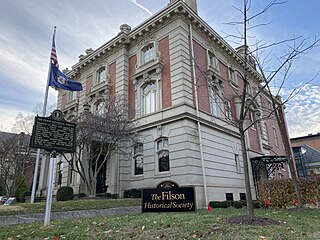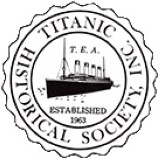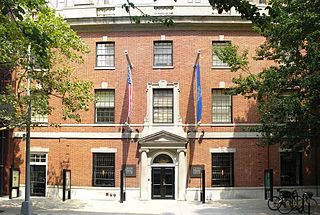
The Filson Historical Society, founded in 1884, is a privately supported historical society located at 1310 South 3rd Street in Louisville, Kentucky. The Filson is an organization dedicated to providing continuing adult education in the form of quarterly peer-reviewed academic journal, Ohio Valley History, a quarterly magazine, The Filson, weekly lectures, historical tours, and exhibits.

The Titanic Historical Society, Inc. (THS) is a non-profit organization founded on July 7, 1963, whose purpose is the preservation of the history of the famous ocean liner RMS Titanic, which sank in 1912, in one of the greatest maritime disasters in history.
The American Council of Learned Societies (ACLS) is a private, nonprofit federation of 75 scholarly organizations in the humanities and related social sciences founded in 1919. It is best known for its fellowship competitions which provide a range of opportunities for scholars in the humanities and related social sciences at all career stages, from graduate students to distinguished professors to independent scholars, working with a number of disciplines and methodologies in the U.S. and abroad.

Historic New England, previously known as the Society for the Preservation of New England Antiquities (SPNEA), is a charitable, non-profit, historic preservation organization headquartered in Boston, Massachusetts. It is focused on New England and is the oldest and largest regional preservation organization in the United States. Historic New England owns and operates historic site museums and study properties throughout all of the New England states except Vermont, and serves more than 198,000 visitors and program participants each year. Approximately 48,000 visitors participate in school and youth programs focused on New England heritage.

The Chicago Theatre, originally known as the Balaban and Katz Chicago Theatre, is a landmark theater located on North State Street in the Loop area of Chicago, Illinois. Built in 1921, the Chicago Theatre was the flagship for the Balaban and Katz (B&K) group of theaters run by A. J. Balaban, his brother Barney Balaban and partner Sam Katz. Along with the other B&K theaters, from 1925 to 1945 the Chicago Theatre was a dominant movie theater enterprise. Currently, Madison Square Garden, Inc. owns and operates the Chicago Theatre as a performing arts venue for stage plays, magic shows, comedy, speeches, sporting events and popular music concerts.

The United States Army Center of Military History (CMH) is a directorate within the United States Army Training and Doctrine Command. The Institute of Heraldry remains within the Office of the Administrative Assistant to the Secretary of the Army. The center is responsible for the appropriate use of history and military records throughout the United States Army. Traditionally, this mission has meant recording the official history of the army in both peace and war, while advising the army staff on historical matters. CMH is the flagship organization leading the Army Historical Program.

The Yeshiva University Museum is a teaching museum and the cultural arm of Yeshiva University. Along with the American Jewish Historical Society, the American Sephardi Federation, the Leo Baeck Institute, New York and the YIVO Institute for Jewish Research, it is a member organization of the Center for Jewish History, a Smithsonian Institution affiliate located in New York’s Chelsea neighborhood.

The Georgia Historical Society (GHS) is a statewide historical society in Georgia. Headquartered in Savannah, Georgia, GHS is one of the oldest historical organizations in the United States. Since 1839, the society has collected, examined, and taught Georgia history through a variety of educational outreach programs, publications, and research services.

A historical society is an organization dedicated to preserving, collecting, researching, and interpreting historical information or items. Originally, these societies were created as a way to help future generations understand their heritage.
Joseph R. DuciBella A.S.I.D. was an interior designer, founding member of the Theatre Historical Society of America (1969), author, and noted architectural historian.

A conservator-restorer is a professional responsible for the preservation of artistic and cultural artifacts, also known as cultural heritage. Conservators possess the expertise to preserve cultural heritage in a way that retains the integrity of the object, building or site, including its historical significance, context and aesthetic or visual aspects. This kind of preservation is done by analyzing and assessing the condition of cultural property, understanding processes and evidence of deterioration, planning collections care or site management strategies that prevent damage, carrying out conservation treatments, and conducting research. A conservator's job is to ensure that the objects in a museum's collection are kept in the best possible condition, as well as to serve the museum's mission to bring art before the public.

HistoryMiami Museum, formerly known as the Historical Museum of Southern Florida, is a museum located in Downtown Miami, Florida, United States. HistoryMiami Museum is the largest history museum in the State of Florida. HistoryMiami houses four permanent galleries and up to three traveling exhibits, Archives and Research Center, the South Florida Folklife Center, the Education Center, and City Tours program. Each February, HistoryMiami also hosts the annual Miami International Map Fair, the largest map fair in the Western Hemisphere.

Local history is the study of history in a geographically local context, often concentrating on a relatively small local community. It incorporates cultural and social aspects of history. Local history is not merely national history writ small but a study of past events in a given geographical area which is based on a wide variety of documentary evidence and placed in a comparative context that is both regional and national. Historic plaques are one form of documentation of significant occurrences in the past and oral histories are another.
Historic preservation in New York is activity undertaken to conserve forests, buildings, ships, sacred Indian burial grounds, water purity and other objects of cultural importance in New York in ways that allow them to communicate meaningfully about past practices, events, and people. Governmental programs for historic preservation range from Federal ownership and active operation of sites to grants and subsidies provided by state government, municipal support of museums and interpretative displays. Nonprofit programs include activities of statewide and local historical associations and museums, and activities of historical societies and museums at the national level. Quasi-governmental organizations, such as the New York State Thruway Authority and Thousand Islands Bridge Authority, play a role as well. Private endeavors, such as investment and other choices made by private landowners to conserve historical features of their properties, are significant but less visible and include groups such as the Historic Districts Council, The New York Landmarks Conservancy and the Preservation League of New York State. During the reconstruction of the World Trade Center site in July 2010, a team of archaeologists discovered a 32-foot-long boat. The craft was at least 200 years old, dating from a time when the Hudson River was partly filled with trash and debris because of a rapidly expanding lower Manhattan.

The Balboa Theatre is a historic vaudeville/movie theatre in downtown San Diego, US, built in 1924. Listed on the National Register of Historic Places in 1996, the Balboa was refurbished and reopened as a performing arts venue in 2008.

The New Hampshire Historical Society is an independent nonprofit in Concord that saves, preserves, and shares New Hampshire history.
The La Jolla Historical Society is a private 501(c)(3) nonprofit organization in the La Jolla community within San Diego, California that is committed to the discovery, collection and preservation of La Jolla’s heritage through collections, programs and advocacy.
C. Malcolm Watkins (1911–2001) was an American historian, archaeologist, and curator. He researched early American material culture, with a specific interest in the decorative arts. Watkins served as a head curator of the Department of Cultural History at the National Museum of American History at the Smithsonian Institution in Washington, D.C. He spent a total of 31 years working at the Smithsonian.
The Glendora Historical Society is a privately funded nonprofit organization based in Glendora, California. The Society produces original exhibitions; maintains a collection of historical documents, photographs, and other research materials; and hosts educational events.
Founded in 1916, the Columbia County Historical Society and CCHS Museum & Library collects, preserves, interprets, and presents the history, heritage, and culture of Columbia County, New York, and serves residents of all eighteen Columbia County towns and the city of Hudson.












